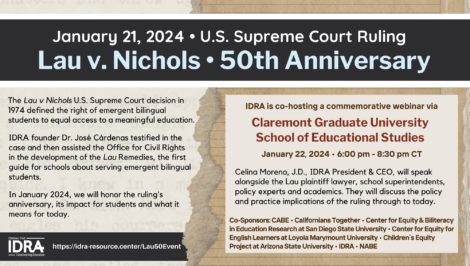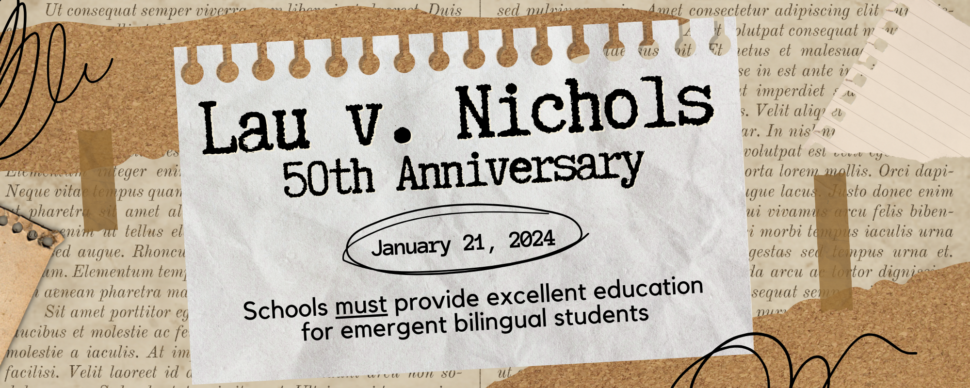January 21, 2024 marks the 50th anniversary of the milestone Lau v. Nichols U.S. Supreme Court ruling.
With the impact of this ruling and it’s connection to IDRA’s work across five decades, we are not just remembering it on January 21, we are commemorating it throughout 2024 with stories, podcast episodes and more.
Students who speak a language other than English have the right to comprehensible instruction that fosters learning. On January 21, 1973, the U.S. Supreme Court ruled unanimously that schools must respond to the language characteristics of children.
In the Lau v. Nichols case, the court determined that the provision of equal programs to different children constituted a denial of equality of educational opportunity, namely that it is the responsibility of the school to adapt to the varying characteristics of children rather than placing the burden on children to adapt to the characteristics of a single school program.
During the 1970s there were many court cases dealing with educational opportunity for emergent bilingual students. Prior to it becoming a legal issue in U.S. v. Texas (1971) a similar court case, Lau v. Nichols, had succeeded in California. Dr. José Cárdenas said, “Both court cases, as well as dozens of others, were based on the indifference of school systems to the language characteristics of minority children.”
Dr. José A. Cárdenas described the case: “Edward Steinman, attorney for the plaintiffs in Lau, represented some 1,800 Chinese American children in the San Francisco schools who had limited proficiency in English and were receiving no special program in the schools. Although the San Francisco school district did have a number of programs for non-English speaking-students, including a bilingual education program, the implementation of these programs was on a hit-or miss basis, with some children participating in a program where available, others participating in more than one program, and at least 1,800 Chinese children not participating in any program.”
He continued: “The San Francisco schools argued in court that although they operated several programs responsive to the language characteristics of children, they had no legal obligation to do so. They maintained that the children not participating in any special program were being treated equitably since they were receiving the same instruction by the same teachers as that which was being afforded English-speaking children.”
Dr. José Cárdenas and Dr. Blandina “Bambi” Cárdenas (no relation) served as consultants to the Civil Rights Division of the Department of Justice in preparing a brief that J. Stanley Pottinger presented to the Supreme Court on behalf of the plaintiffs.
The Lau decision was followed in 1975 by the establishment of a Lau taskforce by the Office for Civil Rights in the Department of Health, Education and Welfare to develop guidelines for schools to follow in complying with the Lau decision. Dr. Cárdenas was appointed a member of this task force as one of the leading advocates of bilingual education in the country.
“It must be remembered that the civil rights of children remain unchanged. Educators must use the most appropriate tools available to ensure their students’ success. One of these tools is bilingual education… Years of research have proven that bilingual education, when implemented well, is the best way to learn English. Children in such programs achieve high academic standards. IDRA’s research and work re-affirms what is possible when committed and dedicated individuals use research to develop and provide excellent bilingual education programs for their students.”
– María “Cuca” Robledo Montecel, IDRA President Emerita, 2004
Commemorative Event
 IDRA is co-hosting a commemorative webinar via Claremont Graduate University School of Educational Studies. Celina Moreno, J.D., IDRA President & CEO, will speak alongside the Lau plaintiff lawyer, school superintendents, policy experts and academics. They will discuss the policy and practice implications of the ruling through to today.
IDRA is co-hosting a commemorative webinar via Claremont Graduate University School of Educational Studies. Celina Moreno, J.D., IDRA President & CEO, will speak alongside the Lau plaintiff lawyer, school superintendents, policy experts and academics. They will discuss the policy and practice implications of the ruling through to today.
About the Ruling
This Lau v. Nichols ruling states, “Under these state-imposed standards there is no equality of treatment merely by providing the same facilities, textbooks, teachers and curriculum for students who do not understand English effectively.”
It did the following:
- Found a denial of equal educational opportunity under the Civil Rights Act of 1964.
- Affirmed the authority of the U.S. Department of Health, Education and Welfare to enforce the Civil Rights Act of 1964 (equal educational opportunity).
- Affirmed the validity of the May 25th Memorandum extending the Civil Rights Act of 1964 to language-minority children.
- Affirmed the authority of the U.S. Department of Health, Education and Welfare “to require affirmative remedial efforts to give special attention to linguistically deprived children.”
In the decision, Justice Douglas stated: “Basic English skills are at the very core of what the public schools teach. Imposition of a requirement that, before a child can effectively participate in the educational program, he must already have acquired those basic skills is to make a mockery of public education. We know that those who do not understand English are certain to find their classroom experience totally incomprehensible and in no way meaningful.”
Read: Legal Basis of Bilingual Education – An Excerpt, article by Dr. José A. Cárdenas, 1976
A Legacy of Strengthening Bilingual Education
Over the next 50 years since the Lau v Nichols ruling and development of the Lau Remedies, IDRA has led the nation in advancing policies, training educators, researching best practices, supporting student advocates, sparking coalitions and developing ground-breaking curricula to ensure emergent bilingual students have access to an excellent education.
A few highlights:
- IDRA was selected as one of the first federal equity assistance centers (EAC). Our initial center helped schools serve emergent bilingual students in Louisiana and Texas in response to the U.S. Supreme Court’s landmark Lau v. Nichols ruling.
- IDRA helped write Texas’ first bilingual education law, which is still on the books today.
- IDRA has trained tens of thousands of teachers in bilingual classrooms, including hundreds who transitioned to teaching from other careers.
- IDRA developed in 1976 Amanecer, the nation’s first bilingual-bicultural preschool curriculum that incorporated the language and cultural characteristics of young children, parents and teachers. Our latest curriculum, Semillitas de Aprendizaje, is engaging young students with captivating bilingual stories.
- IDRA recently co-led the Early Childhood English Learner Initiative, which led to the required development of an early childhood statewide plan for support of emergent bilingual students.
- IDRA researched bilingual education funding in multiple states and, in a nationwide study, identified the 25 common characteristics that contribute to high academic performance of students served by bilingual education programs.
- 2013
- IDRA collaborated with Native American tribes in Oklahoma to support language preservation by translating children’s books for learning key concepts.
- IDRA sparked Texas’ change in terminology about students to the asset-based, emergent bilingual.
- IDRA presented trial testimony based on expert reports IDRA prepared showing that the school finance system underfunded bilingual education (among other findings).
- IDRA helped shape Texas’ bilingual special education certification, which IDRA helped establish through its advocacy in the 2021 Texas legislative session.
- IDRA published a free teacher resource in 2022, Serving Emergent Bilingual Students – Online Technical Assistance Toolkit.
Learn more about our emergent bilingual student education policy work.


